Ministry of Defence
Mastering existing tech & staying ready for new innovations & unforeseen challenges is key to effectively tackle complexities of modern-day warfare: Raksha Mantri at RAN SAMWAD
“Self-reliance is no longer just a slogan; it is the unbreakable foundation of our national security”
“National security is no longer a matter of Armed Forces, it has become an issue of a whole-of-nation approach”
Shri Rajnath Singh releases Joint Doctrine for Multi Domain Operations & Technology Perspective & Capability Roadmap
Posted On:
27 AUG 2025 1:45PM by PIB Delhi
Dubbing the fusion of technology and surprise as the main reason behind the growing complexity & unpredictably of modern-day warfare, Raksha Mantri Shri Rajnath Singh has emphasised the need to remain prepared for new innovations and unforeseen challenges while mastering existing technologies to stay ahead of the curve. He was delivering the plenary address at RAN SAMWAD, a first-of-its-kind Tri-service seminar on war, warfare and warfighting, at the Army War College in Dr Ambedkar Nagar, Madhya Pradesh on August 27, 2025.
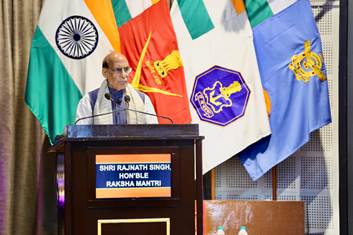
“Modern battles are no longer confined to land, sea, and air; they now extend into outer space and cyberspace. Satellite systems, anti-satellite weapons, and space command centres are the new instruments of power. What we require today is not just defensive preparedness, but also a proactive strategy. Future wars will not merely be battles of weapons; they will be a combined play of technology, intelligence, economy and diplomacy. The nation which masters the triangle of technology, strategy and adaptability will emerge as the true global power. This is the moment to learn from history and write a new one; this is the moment to anticipate the future and shape one,” stated Raksha Mantri.
Shri Rajnath Singh stressed that sheer numbers of soldiers or the size of weapon stockpiles are no longer enough, as cyber warfare, artificial intelligence, unmanned aerial vehicles, and satellite-based surveillance are shaping the wars of the future. He termed precision-guided weapons, real-time intelligence, and data-driven information as the cornerstone of success in any conflict.
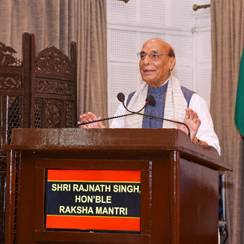
“Technology is advancing at such a pace that by the time we fully grasp one innovation, another emerges - completely altering the course of warfare. Unmanned Aerial Vehicles, hypersonic missiles, cyber-attacks, and AI-driven decision making are examples of tools that are bringing unexpected twists to modern conflicts. The most striking feature of this element of surprise is that it no longer has a permanent form. It keeps changing, always carrying uncertainty with it. And it is precisely this uncertainty that confounds adversaries, often becoming the decisive factor in the outcome of war,” elucidated Raksha Mantri.
Shri Rajnath Singh asserted that, in today’s world, whichever nation decides the battlefield is the one that controls the game and its rules, and others have no option but to respond on terms that are not of their choosing. “Our endeavour must be to define the battlefield and the rules of the game ourselves, compelling the adversary to fight there, so that the lead advantage always remains with us,” he said, describing the success of Operation Sindoor as one perfect example, and a striking demonstration of technology-driven warfare.
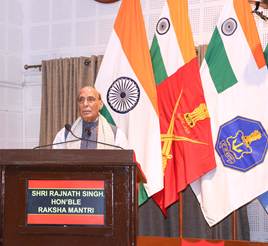
Raksha Mantri noted the bravery and swiftness with which the Indian Armed Forces carried out action against the terrorists sheltered in Pakistan, terming it “something the adversary could never have imagined”. He stated that the operation provided a wealth of lessons - be it offensive or defensive techniques, operational practices, quick and efficient war logistics, seamless integration of the forces or matters of intelligence and surveillance that could serve as valuable guidance for any conflict in the future.
“Operation Sindoor highlighted the importance of information and cyber warfare in today’s age. While enhancing our defence capabilities, it is equally vital to ensure that our information and cyber infrastructure is made even more robust. The jointness and integration of our forces played a major role in the success of the operation. We need to move forward in strengthening the joint strategic communication,” added Shri Rajnath Singh.
Acknowledging the Army Training Command’s decision to provide drone technology-related training to all jawans of the Army by 2027, Raksha Mantri stated that the resolve will undoubtedly prove to be a game changer step. He also appreciated the Army’s initiative of the formation of Rudra Brigade, ShaktiBaan Regiment, Divyastra Battery, Drone Platoon, and Bhairav Battalion, terming the decision as a necessary step according to the changing times.
Raksha Mantri described Operation Sindoor as a glowing example of the success of indigenous platforms, equipment, and weapon systems, stating that “the achievements have underlined that self-reliance is an absolute necessity”. He reiterated Prime Minister Shri Narendra Modi-led Government’s commitment to achieve ‘Aatmanirbharta’ in defence, stating that India, which was once counted among the largest importers, is making a place among the reliable exporters of the world.
“Today, our indigenous platforms, Light Combat Aircraft Tejas, Advanced Towed Artillery Gun System, Akash Missile System, and Indigenous Aircraft Carrier are giving a message to the world that India's technology and quality are now standing at world-class standards. This confidence and strength are due to our scientists, our industry, and our leadership. We are manufacturing all the equipment in our country that we used to import. We have taken another step forward in the direction of producing fifth-generation fighter aircraft. We are moving fast in the direction of making jet engines in India itself,” added Shri Rajnath Singh.
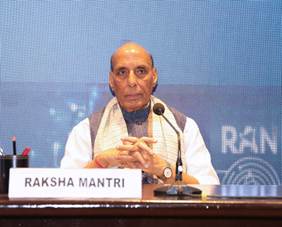
Raksha Mantri described the record defence production of over Rs 1.50 lakh crore in Financial Year 2024-25, which was just Rs 46,425 crore in 2014, and all-time high exports figure of around Rs 24,000 crore, which was less than Rs 1,000 crore 10 years ago, as a testimony to the progress made towards achieving the goal of self-reliance. “It is a symbol of India’s changing global identity. Today, when the world sees the Make-in-India label, it gets assurance and confidence in the quality of our indigenously-developed platforms and systems. This is the real strength of Aatmanirbhar Bharat. Self-reliance is no longer just a slogan; it is the unbreakable foundation of our national security,” he said, while appreciating the vital contribution of the private sector in realising the vision.
Shri Rajnath Singh defined the ‘Sudarshan Chakra’ Mission announced by PM Modi as the Government’s resolve for self-defence, under which, vital locations will be covered with a shield of modern and indigenously developed technology. He made special mention of DRDO’s successful maiden test of Integrated Air Defence Weapon System, and a High Powered Directed Energy Weapon, terming the achievements as the success of the entire nation.
On the recent commissioning of stealth frigates - INS Himgiri and INS Udaygiri, Raksha Mantri said the Government is working with full readiness to make the Indian Navy stronger and more robust in line with the changing world and evolving technology. He commended the Navy for maintaining strategic positions during Operation Sindoor, which limited the enemy's movement completely in the Arabian Sea. “Our Navy's presence in the Indian Ocean is keeping our maritime borders completely secure,” he said.
Shri Rajnath Singh added that the Indian Air Force is being continuously strengthened through the induction of long-range missiles to next-generation beyond visual range weapons among other. The Counter Unmanned Aerial Systems Grid is also being further strengthened in view of the increasing use of drones, he said.
Given the unpredictable nature of warfare, Raksha Mantri stressed on the need to keep strengthening the domestic defence industry in order to ensure that the nation is prepared for every situation. “If any war stretches for 2 months, 4 months, a year, 2 years, even 5 years, then we should be fully prepared. We must ensure that our surge capacity is sufficient,” he said.
Emphasising that a conflict affects the entire country, Shri Rajnath Singh called upon every citizen to stay alert and capable at their own level, as the scope of defence preparedness cannot be limited to the Armed Forces alone. “A country’s economic system, industrial structure, technological capabilities, education system - all these have become major components of security. In such a situation, the importance of communication becomes even greater. National security is no longer just a matter of Armies but has become an issue of a whole-of-nation approach. The active role of industries, academia, media, technical institutes, and civil society is necessary,” he said.
Raksha Mantri stressed that the challenges before India are formidable, but its resolve and courage are even bigger, adding that “the world respects us not just for strength but for our dedication to truth, peace, and justice.” He maintained that India has never been a nation that seeks war or harbours aggressive intent, but if someone poses a challenge, it becomes imperative that the nation responds with strength. “We do not want anyone’s land, but we are ready to go to any extent to protect our land. To do so, we must continuously enhance our defence preparedness. This is why training, technological advancement, and sustained dialogue with partners are of utmost importance,” he said.
Raksha Mantri exuded confidence that the thoughts and conclusions emerging from the dialogue will not only strengthen the nation’s defence strategy but also make a long-term contribution to the overall security architecture and its path to development.
As part of the event, Shri Rajnath Singh released the Joint Doctrine for Multi Domain Operations. The doctrine charts the way forward for integrated & synergised employment of the Armed Forces across land, sea, air, space, cyber & cognitive domains - strengthening jointness & future readiness. In order to enhance accessibility and wider dissemination, the Doctrine can be accessed at http://ids.nic.in/content/doctrines.
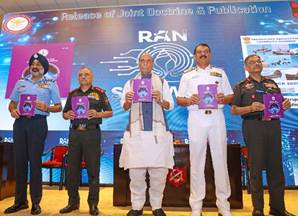
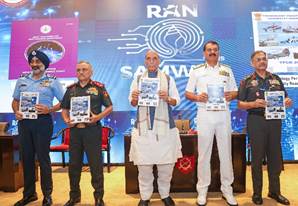
The Technology Perspective & Capability Roadmap was also released by Raksha Mantri. It outlines the Armed Forces’ long-term modernisation plans over a 10-year period, focusing on bridging capability gaps and building technologically advanced forces. The roadmap provides industry with an overview of the Armed Forces’ future capability requirements across various domains. Its purpose is to guide Indian industry and R&D institutions in aligning their innovation and production efforts with national defence needs, fostering self-reliance, reducing dependence on imports and ensuring that the armed forces are optimally structured and equipped for future security challenges.
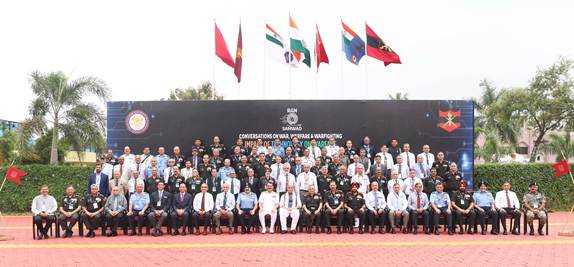
Chief of Defence Staff General Anil Chauhan, Chief of the Naval Staff Admiral Dinesh K Tripathi, Chief of the Air Staff Air Chief Marshal AP Singh, Vice Chief of the Army Staff Lieutenant General Pushpendra Singh, former Chief of the Air Staff Air Chief Marshal VR Chaudhari, former Chief of the Naval Staff Admiral Arun Prakash, foreign Defence Attaches, scholars & think-tanks, academicians & industry leaders, veterans & officers from Ministry of Defence were present on the occasion.
****
VK/Savvy
(Release ID: 2161131)
Visitor Counter : 1292